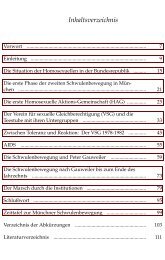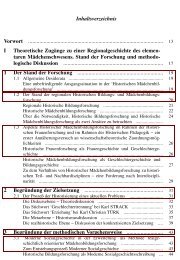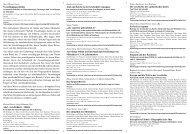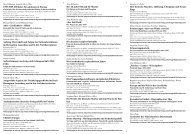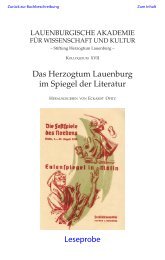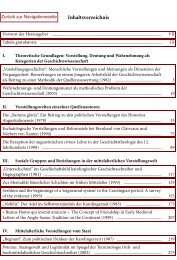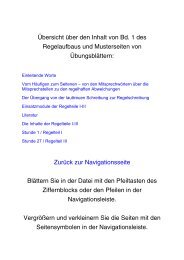Inhaltsverzeichnis/Table des matières - Dr. Dieter Winkler Verlag
Inhaltsverzeichnis/Table des matières - Dr. Dieter Winkler Verlag
Inhaltsverzeichnis/Table des matières - Dr. Dieter Winkler Verlag
Erfolgreiche ePaper selbst erstellen
Machen Sie aus Ihren PDF Publikationen ein blätterbares Flipbook mit unserer einzigartigen Google optimierten e-Paper Software.
Abstracts/Résumés 305<br />
MIHAI-ŞTEFAN CEAUŞU<br />
Joseph’s II Reforms in the Bucovina<br />
After the end of the Russo-Turkish war (1768-1774) power-relations changed in<br />
southeast Europe. In 1774 the north-western parts of the Principality of Moldavia,<br />
until then a vassal-state of the Ottoman Empire, were separated and, under<br />
the name of “Bucovina”, transferred to the Habsburg Monarchy. In creating administrative<br />
organizations in this new and strange territory, the Viennese central<br />
authorities relied on the ideas of the Enlightenment which are known under the<br />
name of “Josephinism” in the Habsburg lands. Existing structures in the fields of<br />
administration, economics, ecclesiastical affairs, demography, culture and society<br />
were adapted to modern regulations. However, sometimes these measures<br />
were taken at a pace which was too fast for the structure of Bucovina. The most<br />
important and long-lasting innovations were introduced in the field of ecclesiastical<br />
affairs and in the system of education; the land’s administration was also<br />
very soon integrated into the general system prevailing in the Habsburg Monarchy.<br />
Pendant l’automne 1774, dans les conditions existantes dans l’Est et le Sud-Est<br />
de l’Europe à la fin de la guerre russo-turque de 1768-1774, la région du Nord-<br />
Ouest de la principauté de la Moldavie, Êtat vassal <strong>des</strong> Ottomans, est devenue,<br />
sous le nom de Bucovine, une composante de l’Empire autrichien. Pour organiser<br />
le nouveau territoire, les autorités habsbourgeoises ont appliqué les idées politiques<br />
du joséphisme, idées dominantes à l’époque dans la Monarchie <strong>des</strong> Habsbourg.<br />
Dans les gran<strong>des</strong> lignes, elles ont envisagé la transformation, comme modernisation<br />
<strong>des</strong> vieilles structures politico administratives, économiques, ecclésiastiques,<br />
démographiques, culturelles et sociales qui existaient en Bucovine,<br />
par <strong>des</strong> mesures qui ont été imposées par les gouvernants, souvent à un rythme<br />
trop rapide. Parmi les réorganisations joséphistes appliquées au niveau de la société<br />
de la Bucovine, les plus importantes, par leur effet et leur durée, ont été celles<br />
<strong>des</strong> domaines ecclésiastiques, culturels et scolaires, ainsi que celles relatives<br />
au statut politico-administratif de cette province dans le cadre de l’Empire autrichien.<br />
TRISTAN COIGNARD<br />
The reform of the theatres in Vienna<br />
The transformation of the “Theater nächst der Burg” into the “Teutsches Nationaltheater”<br />
in the year 1776 stands for Joseph’s political wish to convey the ideas<br />
of the enlightenment by deliberate promotion of German plays on stage. How-



